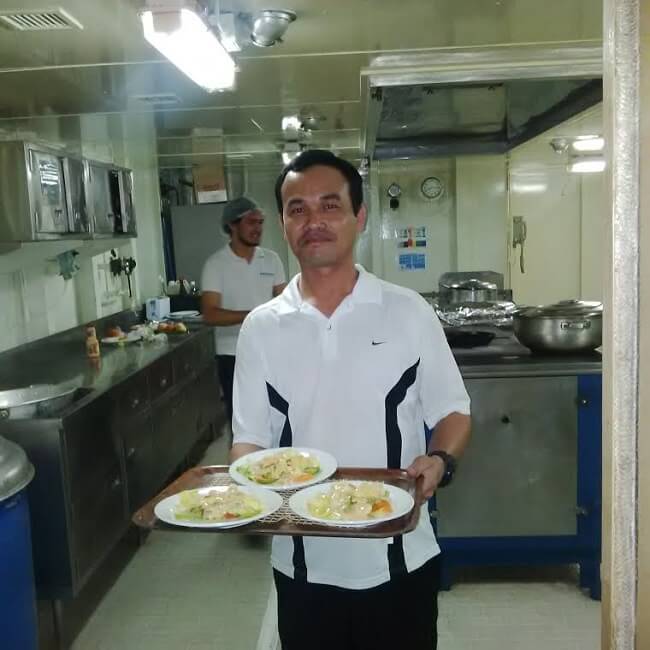Who Should Take the Responsibility of the Food Provision Supply On Merchant Ships – the Master or the Company?
Seafarers at sea work in tough environmental conditions which often require good amount of physical strength. The food for seafarer thus needs to be of the best quality with all the necessary ingredients required to support a healthy body and mind.
The quality and the quantity of the meals onboard are dependent on a myriad of factors, some of which are controllable, whereas and others are not. Most companies provide Victualing allowance on a per man per day basis, the amount of which varies from one company to another and ranges from $6.00 to $8.50 as per current tariff.
On the alleged inadequacies of food provisions supplied onboard affects the well being of the Officers and Crew on board ship, it is best to take a close look at the grass root level – the method of Ordering and Supply of provision.

The manner of ordering and supplying food provision to the seafarers on board the vessels differs from one company to another. Some companies allow Self Purchase of Provisions while others do it thru the companies Procurement Group. In the later, the companies do the requisitions on line and the Ship Chandlers delivers the food provisions at the designated port upon the vessels’ arrival.
A comparative evaluation of different methods of ordering and supplying provisions to the vessel discloses the following advantages and disadvantages:
When the Provisions are Self Purchased, the known advantages are:
1.) The company provides Cash to Master to ensure that a two (2) to three (3) months food provision inventory is available on board, depending on the vessels’ trade routes. This gives them the advantage and the adaptability in sourcing out the supply from a cheaper place depending again routes she plies.
2.) The Percentage rebates received from the Ship Chandler may form as a buffer fund, thus having additional budget for the next purchase cycle.
3.) The Master of the vessel has a direct control in the replenishment of supply for fresh vegetables and fruits.
4.) They can enjoy the benefits of self-purchase from the wet markets while in Port.
5.) This works best if the Food Allowance is at the minimum and the vessel has ample time to stay in port as in the case of the Bulk Carriers and some general cargo vessels.
Nevertheless, the system has some disadvantages too:
1.) The Chief Cook and the Master of the vessel are vulnerable to some bribery attempts from the Ship Chandlers.
2.) A Provision weight shortage is imminent because of a possible intentional oversight in the check and balance during the delivery of provisions if the Chief Cook receives a bribe.
3.) This will entail additional workload and hassle to the Steward Department while in port.
On the other hand, when the supply of Food Provisions is through the company’s Procurement group, the known advantages are:
1.) The Company does not need to provide “Cash to Master” for food provision purchase; therefore, the Master keeps a lesser amount of Cash in the ship’s vault while at sea.
2.) The Company can avail of consignment terms from the Ship Chandlers, allowing better flexibility in Operational Cash flow.
3.) This is a more systematic way of handling food provision ordering and supply.
4.) The Master’s name and integrity are keeping intact. It will spare them from the allegations of receiving gifts and bribery from the Ship Chandlers. It is a good riddance from the “Provision, Bonded or Me” tagline, in the event that some lady ship chandler’s will board the vessel in port, flirting with the Master’s on board just to get some orders. I am sure this warms the heart, and bring smiles to the Master’s wives ashore who are not sailing with their husbands.
5.) The members of the Steward Department will have more time to devote for rest and recreation while in port.
6.) This is beneficial for vessels with fast turn-around in port, as in the case of Car carriers and Containers.
Yet, there are also Disadvantages to this system:
1.) It requires careful planning for the strategic re-ordering to replenish the supply of fresh fruits and vegetables.
2.) The Chief Cook must possess adequate skills to manage and budget the food provision allowance within limits.
3.) The ship’s complement does not have the buffer amount for food provision from Ship Chandler’s rebates.
From the foregoing, after weighing the pros and cons of either system, it seems apparent that the supply of food provisions on board merchant ships remains to be the Shipping companies prerogative. However, one of the best ways to maximize the buying potentials of the food provision allowance is to request for a price quotation from the different Ship Chandlers at the port of supply and compare prices.
Although, it does not necessarily guarantee that the cheapest provides the best quality, but it will be a good head start and is beneficial to either supply system. Every Seafarer appreciates a shipping company that cares for their welfare and provides them with an adequate supply of good quality food onboard. While it is true, that being sufficient is relative, at the very least, they expect that the basic food groups are readily available to them during their regular meals, coffee breaks, and off duties from their shipboard work schedules
You may also like to read-Top 7 Things to Eat During and After the 12-4 Night Watch
Do you have info to share with us ? Suggest a correction
Latest Marine career Articles You Would Like:
- A Guide To IMU CET Exam 2024
- A Guide to Merchant Navy Ranks
- What is Marine Engineering: Courses, Job Description & Salary
- Duties of 3rd Officer in Merchant Navy
- What is the Difference between Merchant Navy and Defence Navy?
- Naval Architecture vs Naval Engineering vs Marine Engineering vs Ocean Engineering
Subscribe To Our Newsletters
By subscribing, you agree to our Privacy Policy and may receive occasional deal communications; you can unsubscribe anytime.
















So how many quotations are a shipchandler supposed to handle, for free?
In the end a systematic use of asking for quotation with no real intent to purchase will backfire as the shipchandlers who spent time and resources on gathering prices, often for a huge number of items, are left with nothing for their effort and will blacklist the vessel.
In the northern parts of Europe I know for a fact that the saying goes as this;
Let the desperate (shipchandler) serve the poor (vessel).
Only shipchandlers who do not have firm orders to work with spend their time doing quotations. So one can figure out without being to bright that the vessel won’t necessary get the service or prices it hopes for by putting out price requests. I can guarantee for a fact that they won’t.
The best way to get a good deal with a shipchandler, at least in these parts, are to put down an order and then ask the agent to forward it to the shipchandler. The agent, if they are serious, won’t give the order to someone who will make the agent look bad.
It’s all about trust. Not asking for prices. Good customers do get a good deal, everywhere.
Excuse my English, it could be better.
Hi John,
Thanks for your reading. They will request quotations from Ship Chandlers who are supplying the vessel with stores and spares in the particular port that they intend to replenish their food provision. For Self Purchase, they can always request from two (2) Ship Chandlers and split the orders between them. Let’s face it prices of provision items differ fro one Ship Chandler to another and from Port to Port. Provisions are cheaper in Belgium and Rotterdam than in UK. Once they can establish a good business relationship with the Ship chandlers in their chosen port of supply they can always re-order with them next call. My point is to establish a strategic point of supply to maximize the purchase value of their Victualling allowance. For company purchase, they can still do the same but have to decide which port it will be supplied. This is only the first of the series of articles regarding “food provisions”. Hoping, to somehow shed light to the decades old problem of food provision shortage on board. I believe that I must start looking at the supply system first, before I will take a look at the on board system of handling and managing it, of course, with the capability of the Chief Cook playing the vital role in its effective and efficient utilization and management.
this weekend is good for me, for the reason that tgis
moment i amm reading this impressive informative article here at my
home.
Hi,
Good Day everyone.!
This is Pooja here. I do have food supply agency in India. I am planning to enter supplying food to ships. can anyone guide whom to contact for this?
I am Mr., Santiago from the Philippines we capable of supplying food items for commercial ships.. How doexwe go about it..
Thank you